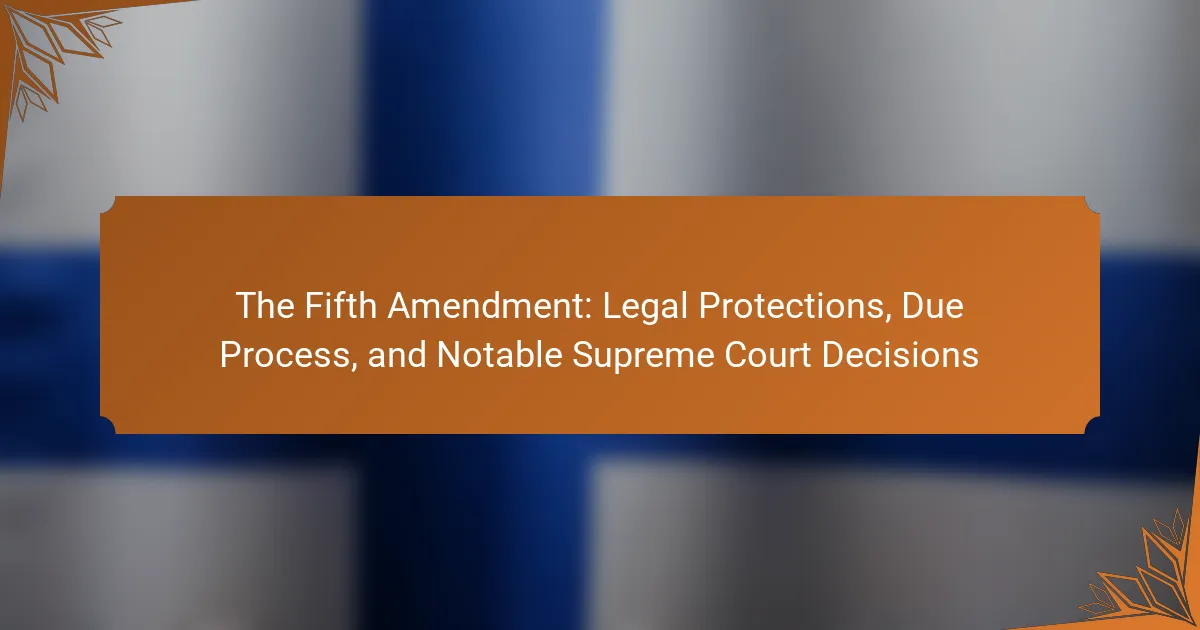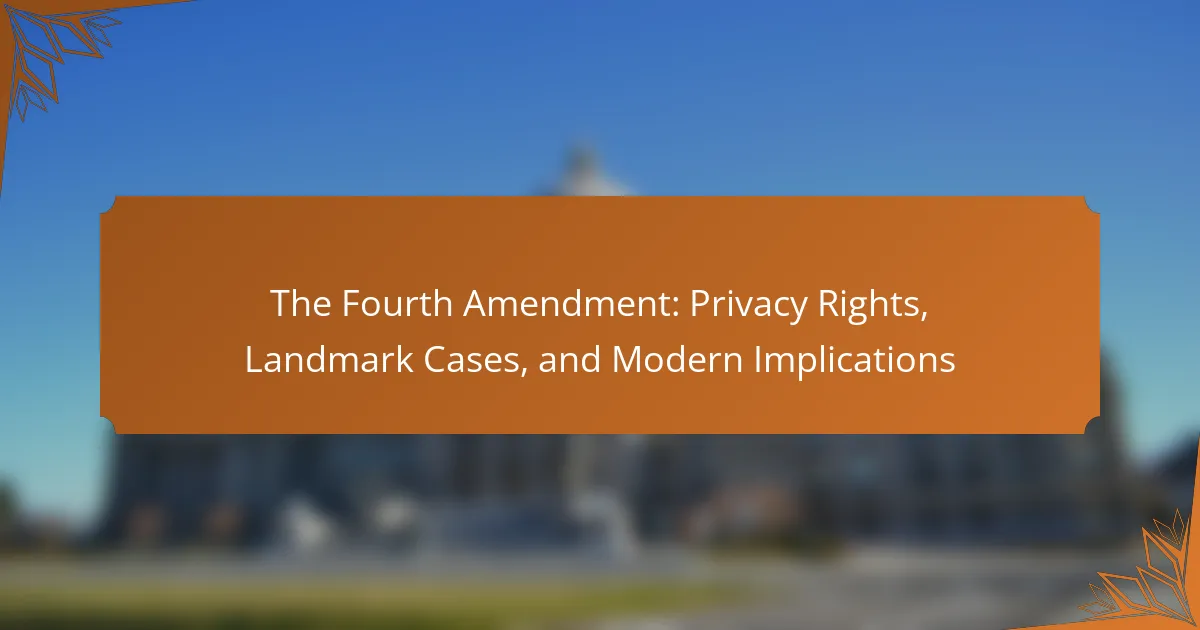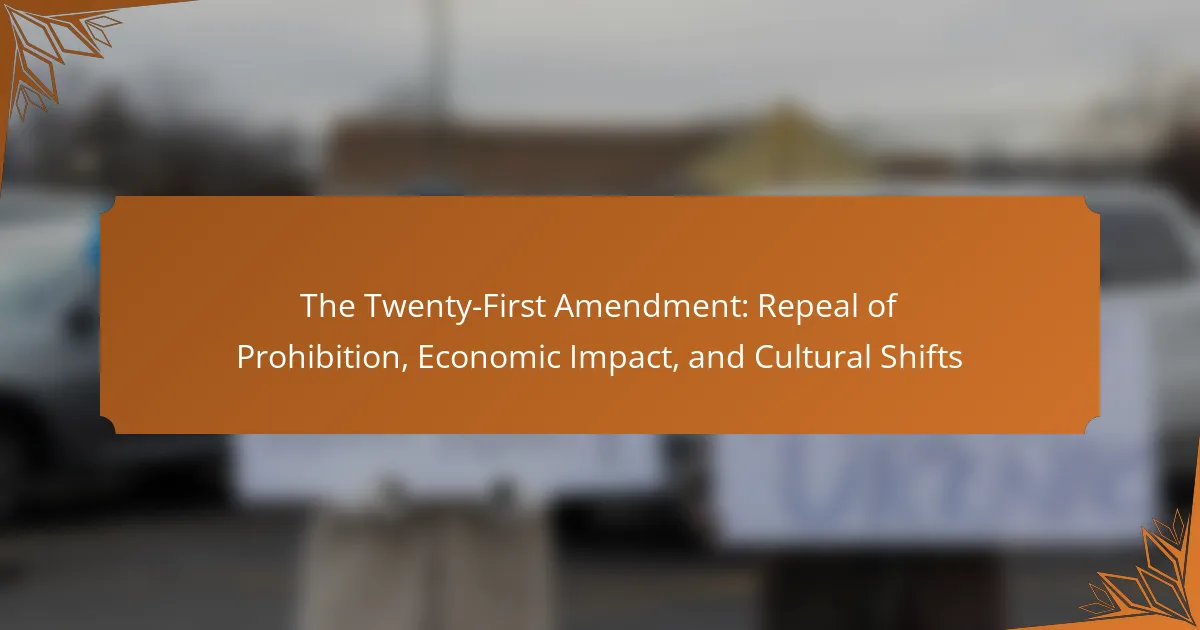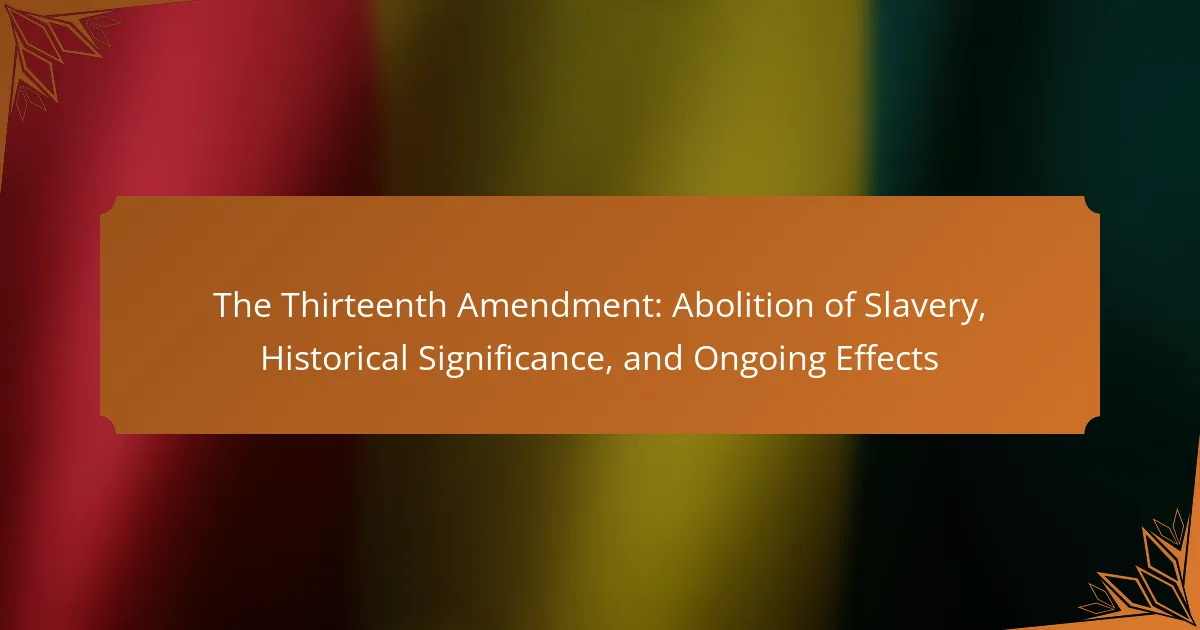The Fifth Amendment is a crucial component of the United States Constitution that provides essential legal protections for individuals. Key protections include the right against self-incrimination, the prohibition of double jeopardy, and the guarantee of due process of law. The amendment also mandates grand jury indictments for capital crimes and requires just compensation for private property taken for public use. Notable Supreme Court cases, such as Miranda v. Arizona and Gideon v. Wainwright, have significantly influenced the interpretation and application of the Fifth Amendment, reinforcing its role in safeguarding individual rights within the legal system.
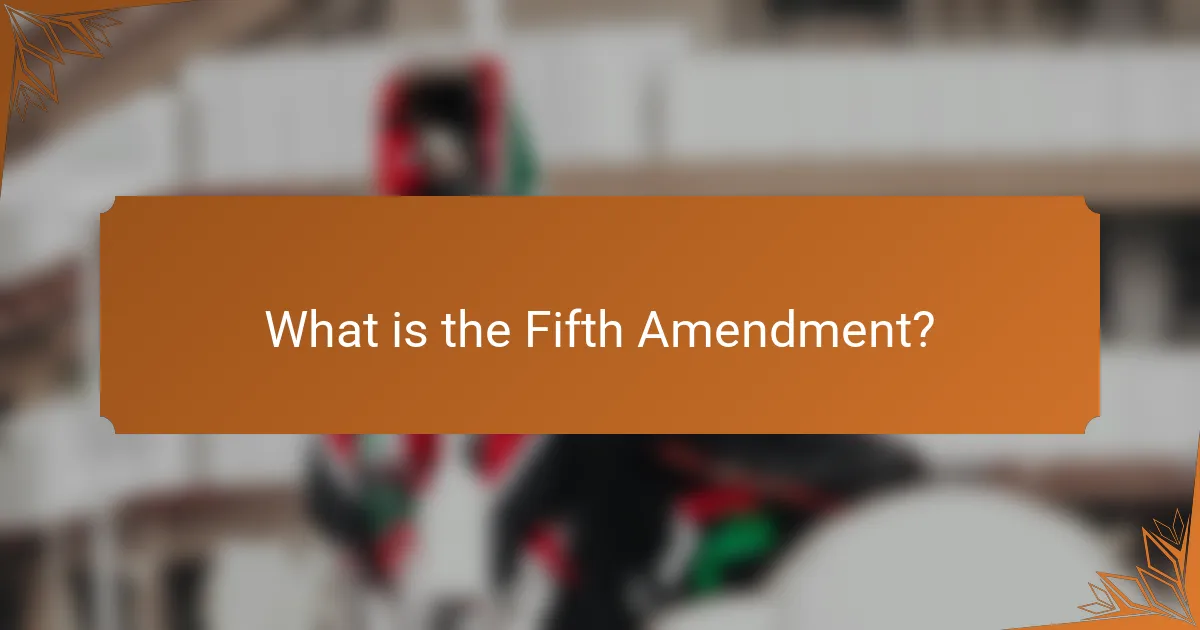
What is the Fifth Amendment?
The Fifth Amendment is a part of the United States Constitution. It provides several legal protections for individuals. These include the right against self-incrimination and double jeopardy. It also ensures due process of law. The amendment requires grand jury indictments for capital crimes. It protects against the taking of private property without just compensation. The Fifth Amendment is fundamental in safeguarding individual rights. It has been the basis for many important Supreme Court decisions.
How does the Fifth Amendment protect individual rights?
The Fifth Amendment protects individual rights by ensuring due process and safeguarding against self-incrimination. It guarantees that no person shall be deprived of life, liberty, or property without due process of law. This means individuals have the right to fair legal procedures before any government action. The amendment also includes the protection against double jeopardy, which prevents an individual from being tried for the same offense twice. Additionally, it mandates that serious criminal charges be initiated by a grand jury. This provision ensures that a group of citizens evaluates the evidence before formal charges are made. The Fifth Amendment is a cornerstone of American legal rights, reinforcing the principle of justice and individual freedoms.
What are the key components of the Fifth Amendment?
The key components of the Fifth Amendment include the right to remain silent, protection against double jeopardy, and the right to due process. The right to remain silent prevents self-incrimination during legal proceedings. Double jeopardy prohibits an individual from being tried twice for the same offense. The right to due process ensures fair treatment through the judicial system. Additionally, the amendment includes the protection of private property through the Takings Clause. This clause mandates just compensation when private property is taken for public use. These components collectively safeguard individual rights within the legal framework of the United States.
How does the Fifth Amendment relate to due process?
The Fifth Amendment directly relates to due process by ensuring that no person is deprived of life, liberty, or property without due process of law. This constitutional provision establishes essential legal protections against arbitrary government actions. It guarantees fair procedures in legal proceedings, which is a fundamental aspect of due process. The amendment has been interpreted by the Supreme Court in various cases to expand the rights of individuals. For instance, in the case of Miranda v. Arizona (1966), the Court ruled that individuals must be informed of their rights during custodial interrogation, reinforcing due process protections. Thus, the Fifth Amendment serves as a cornerstone for safeguarding individual rights within the legal system.
Why is the Fifth Amendment important in the legal system?
The Fifth Amendment is crucial in the legal system because it safeguards fundamental rights of individuals. It protects against self-incrimination, ensuring that a person cannot be compelled to testify against themselves. This principle is vital for maintaining the integrity of the legal process. Additionally, it guarantees due process, which requires fair treatment through the normal judicial system. The amendment also includes protection against double jeopardy, preventing an individual from being tried twice for the same offense. This helps to uphold the principle of finality in legal proceedings. Moreover, the Fifth Amendment mandates that serious criminal charges be initiated by a grand jury, providing an additional layer of protection for defendants. Overall, these protections are essential for ensuring justice and preventing governmental abuse.
What historical context led to the inclusion of the Fifth Amendment?
The historical context leading to the inclusion of the Fifth Amendment stems from colonial experiences with British authority. Colonists faced abuses of power, including forced confessions and arbitrary detentions. The desire for protection against such injustices influenced the framers of the Constitution. The amendment was ratified in 1791 as part of the Bill of Rights. It aimed to ensure fair legal processes and safeguard individual rights. Key provisions include protection against self-incrimination and double jeopardy. These protections reflect a commitment to due process. The historical context emphasizes the importance of limiting governmental power over individuals.
How does the Fifth Amendment influence contemporary legal practices?
The Fifth Amendment influences contemporary legal practices by establishing essential protections against self-incrimination and ensuring due process. This amendment guarantees that individuals cannot be compelled to testify against themselves in criminal cases. It also mandates that no person shall be deprived of life, liberty, or property without due process of law. This has led to the development of procedural safeguards in legal proceedings. For example, the requirement for a grand jury indictment in felony cases stems from the Fifth Amendment. Furthermore, landmark Supreme Court decisions, such as Miranda v. Arizona, have reinforced these protections by establishing the necessity of informing suspects of their rights. Overall, the Fifth Amendment shapes the legal landscape by prioritizing individual rights and fair treatment within the justice system.
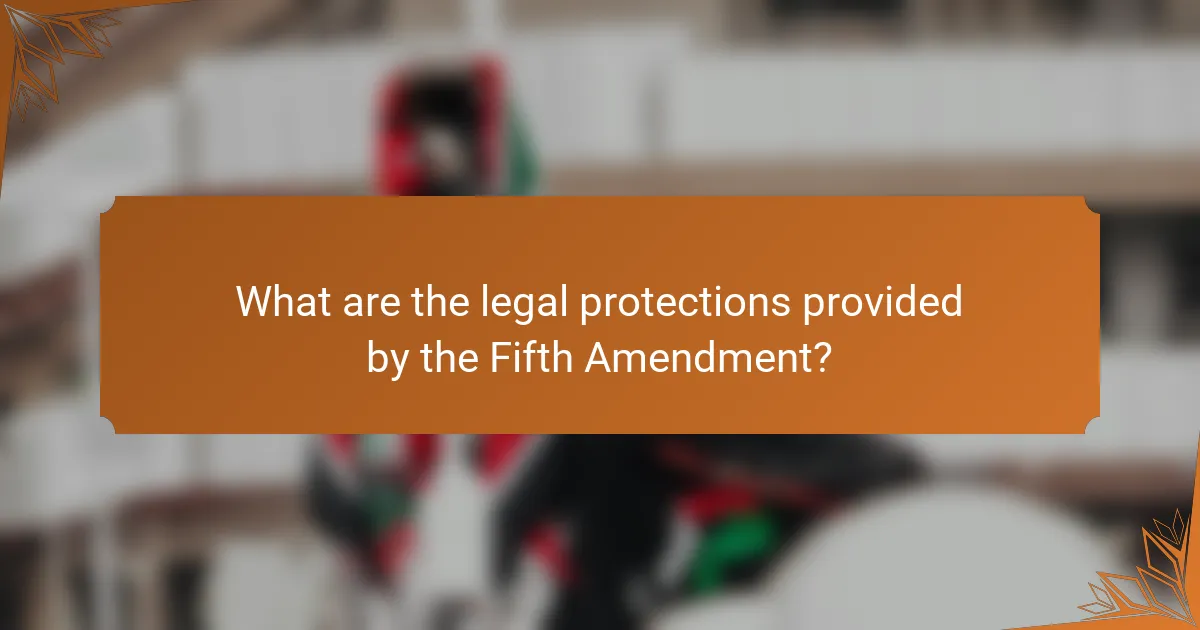
What are the legal protections provided by the Fifth Amendment?
The Fifth Amendment provides several legal protections for individuals. It includes the right against self-incrimination. This means a person cannot be compelled to testify against themselves in a criminal case. The amendment also guarantees the right to due process. Due process ensures fair treatment through the judicial system. Additionally, it protects against double jeopardy. This prevents an individual from being tried twice for the same offense. The amendment also includes the requirement of just compensation for property taken for public use. This means the government must pay fair market value when seizing private property. These protections are fundamental to maintaining individual rights within the legal system.
What are the rights guaranteed under the Fifth Amendment?
The Fifth Amendment guarantees several rights to individuals. These rights include protection against self-incrimination. Individuals cannot be compelled to testify against themselves in criminal cases. The amendment also ensures due process of law. This means that legal proceedings must follow established rules and principles. Additionally, it provides protection against double jeopardy. This prevents individuals from being tried twice for the same offense. The Fifth Amendment also includes the right to a grand jury. This is required for serious criminal charges. Lastly, it guarantees compensation for the government taking private property. This is known as the requirement for just compensation under eminent domain.
How does the right against self-incrimination work?
The right against self-incrimination protects individuals from being compelled to testify against themselves in criminal cases. This legal principle is rooted in the Fifth Amendment of the U.S. Constitution. It ensures that a person cannot be forced to provide evidence that may lead to their own conviction. This right is applicable during police interrogations and court proceedings. The protection extends to both verbal and written statements. A defendant can invoke this right to remain silent when questioned. Courts uphold this protection to ensure fair legal processes. Historical cases, such as Miranda v. Arizona, reinforce the importance of this right. In that case, the Supreme Court ruled that individuals must be informed of their rights before interrogation.
What is the significance of the right to due process?
The right to due process is significant as it ensures fair treatment under the law. It protects individuals from arbitrary denial of life, liberty, or property. Due process mandates legal proceedings that are conducted fairly and with respect to established rules. This right is embedded in the Fifth Amendment of the U.S. Constitution. It has been upheld in numerous Supreme Court cases, reinforcing its importance in maintaining justice. For example, in the landmark case of “Miranda v. Arizona,” the Court emphasized the necessity of informing individuals of their rights. Thus, due process is foundational to the legal system, safeguarding individual freedoms and promoting accountability.
How does the Fifth Amendment address eminent domain?
The Fifth Amendment addresses eminent domain by stating that private property cannot be taken for public use without just compensation. This clause ensures that if the government needs to acquire private land for projects like highways or schools, the owner must be fairly compensated. The concept of “just compensation” is interpreted to mean the fair market value of the property at the time of the taking. This principle is designed to protect property owners from government overreach. The Supreme Court has upheld this interpretation in various cases, reinforcing the necessity of compensation in eminent domain proceedings. Notable cases, such as Kelo v. City of New London, have further clarified the application of this amendment in modern contexts.
What constitutes just compensation under the Fifth Amendment?
Just compensation under the Fifth Amendment constitutes fair market value for property taken by the government. This principle ensures that property owners receive adequate compensation when their property is seized for public use. The U.S. Supreme Court has affirmed this standard in cases such as Kelo v. City of New London, which emphasized the importance of fair compensation. Additionally, just compensation includes any damages suffered due to the taking of the property. The compensation must reflect the property’s value at the time of the taking, ensuring property owners are not financially disadvantaged.
How have eminent domain cases shaped the interpretation of the Fifth Amendment?
Eminent domain cases have significantly influenced the interpretation of the Fifth Amendment. The Fifth Amendment includes a clause that states private property cannot be taken for public use without just compensation. Landmark cases like Kelo v. City of New London (2005) broadened the definition of public use. The Supreme Court ruled that economic development can qualify as public use. This decision sparked debates about property rights and government authority. Additionally, cases such as Penn Central Transportation Co. v. New York City (1978) established criteria for regulatory takings. These rulings have shaped the balance between individual property rights and public interest. They have also led to increased scrutiny of governmental actions regarding property acquisition. Overall, eminent domain cases have evolved the understanding of just compensation and public use in the context of the Fifth Amendment.
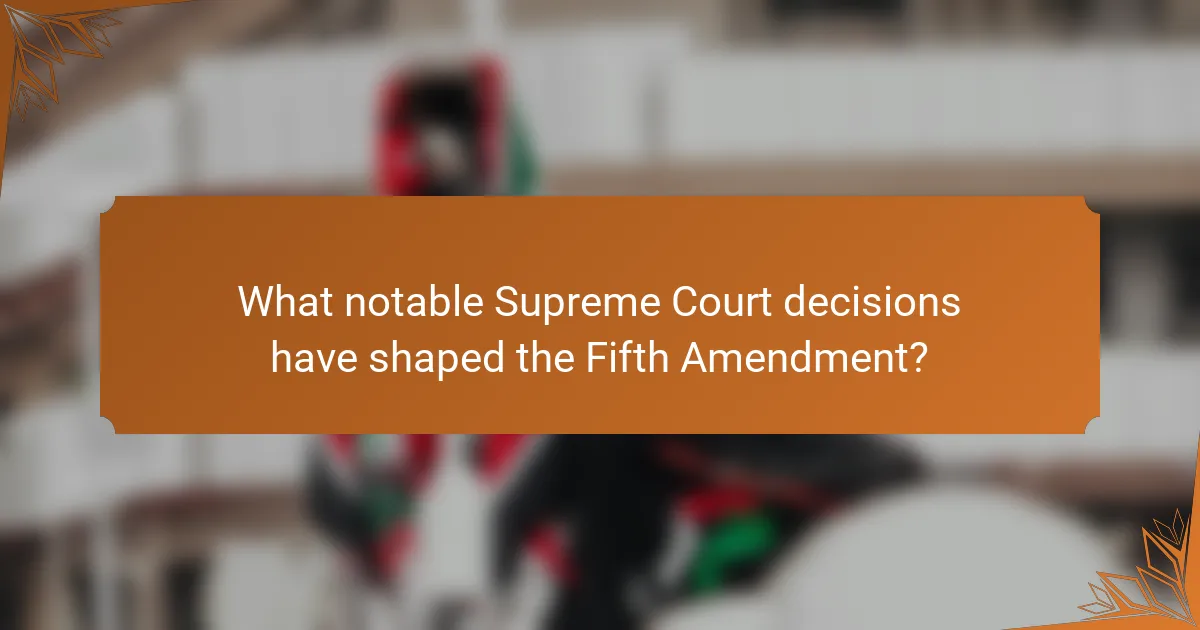
What notable Supreme Court decisions have shaped the Fifth Amendment?
Notable Supreme Court decisions that have shaped the Fifth Amendment include Miranda v. Arizona (1966), which established the Miranda rights. This ruling requires law enforcement to inform suspects of their rights to remain silent and to have an attorney present during questioning. Another significant case is Gideon v. Wainwright (1963), which affirmed the right to counsel for defendants in criminal cases. This decision reinforced the principle of fair trial rights under the Fifth Amendment. Additionally, Kelo v. City of New London (2005) addressed the government’s power of eminent domain, influencing property rights and the just compensation clause. Each of these cases has had a profound impact on legal interpretations of the Fifth Amendment.
Which landmark cases have influenced Fifth Amendment interpretations?
Landmark cases that have influenced Fifth Amendment interpretations include Miranda v. Arizona, Gideon v. Wainwright, and Kelo v. City of New London. Miranda v. Arizona established the requirement for law enforcement to inform individuals of their rights during interrogation. This case emphasized the protection against self-incrimination. Gideon v. Wainwright extended the right to counsel to state courts, reinforcing due process. Kelo v. City of New London addressed the limits of eminent domain under the Fifth Amendment. These cases collectively shaped the understanding and application of the Fifth Amendment in various legal contexts.
What was the significance of Miranda v. Arizona?
Miranda v. Arizona established the requirement for law enforcement to inform suspects of their rights. This landmark Supreme Court case occurred in 1966. The court ruled that the Fifth Amendment protects individuals from self-incrimination. Consequently, suspects must be informed of their right to remain silent and to have legal counsel. This decision aimed to ensure fair treatment during police interrogations. It reinforced the principle of due process under the law. The ruling has had a lasting impact on law enforcement practices across the United States. Miranda warnings are now a standard procedure during arrests.
How did the case of Kelo v. City of New London impact eminent domain?
The case of Kelo v. City of New London significantly impacted eminent domain by broadening its interpretation. The Supreme Court ruled in 2005 that the government could take private property for economic development. This ruling emphasized that “public use” could include public benefit, such as increased tax revenue. The decision sparked nationwide debate about property rights and government power. Critics argued it undermined individual property rights. Supporters claimed it allowed for necessary urban renewal. Following the ruling, several states enacted laws to limit the use of eminent domain for economic development. This case thus reshaped the landscape of eminent domain in the United States.
How do recent Supreme Court decisions reflect changes in Fifth Amendment applications?
Recent Supreme Court decisions demonstrate evolving interpretations of the Fifth Amendment. For instance, in *Shin v. United States* (2021), the Court expanded the scope of self-incrimination protections. This decision emphasized that individuals cannot be compelled to provide information that could lead to criminal charges. Additionally, in *United States v. Haymond* (2019), the Court ruled that judges cannot impose additional prison time based on facts not proven to a jury. This reflects a shift towards stricter adherence to due process rights under the Fifth Amendment. These rulings illustrate a trend of reinforcing individual protections against government overreach.
What trends can be observed in recent rulings related to the Fifth Amendment?
Recent rulings related to the Fifth Amendment show a trend towards reinforcing individual rights against self-incrimination. Courts are increasingly scrutinizing the adequacy of Miranda warnings. This includes ensuring that defendants fully understand their rights before waiving them. Additionally, there is a growing emphasis on the protection of due process. Rulings highlight the need for fair treatment in legal proceedings. Recent cases also address the implications of digital evidence on self-incrimination. Courts are considering how technology affects the scope of Fifth Amendment protections. Overall, these trends reflect a commitment to uphold constitutional safeguards in evolving legal contexts.
How might future cases influence the interpretation of the Fifth Amendment?
Future cases may significantly shape the interpretation of the Fifth Amendment. Each new case can set precedents that influence how legal protections are understood. For instance, rulings could clarify the scope of self-incrimination rights. They may also redefine the application of due process in various contexts. Historical cases, like Miranda v. Arizona, illustrate how judicial decisions impact legal interpretations. As courts address emerging issues, the interpretation of the Fifth Amendment will evolve. This adaptability allows the amendment to remain relevant in contemporary legal scenarios. Future rulings may address technology’s role in self-incrimination or privacy rights, further shaping its application.
What practical tips should individuals know regarding the Fifth Amendment?
Individuals should understand their right to remain silent under the Fifth Amendment. This right protects against self-incrimination during legal proceedings. It is crucial to invoke this right clearly when questioned by law enforcement. Individuals should say they are exercising their Fifth Amendment rights. This prevents any misunderstanding about their intention to remain silent. Additionally, individuals should consult with an attorney before answering any questions. Legal counsel can provide guidance and protect their rights effectively. Knowing these tips ensures individuals can navigate legal situations while safeguarding their constitutional rights.
The Fifth Amendment is a fundamental component of the United States Constitution that provides essential legal protections for individuals, including the right against self-incrimination, protection against double jeopardy, and the guarantee of due process. This amendment also mandates grand jury indictments for serious crimes and ensures just compensation for private property taken for public use. The article explores the key components of the Fifth Amendment, its historical context, notable Supreme Court decisions that have shaped its interpretation, and practical tips for individuals to safeguard their rights. Through a detailed examination, it highlights the significance of the Fifth Amendment in contemporary legal practices and its role in protecting individual freedoms within the justice system.
